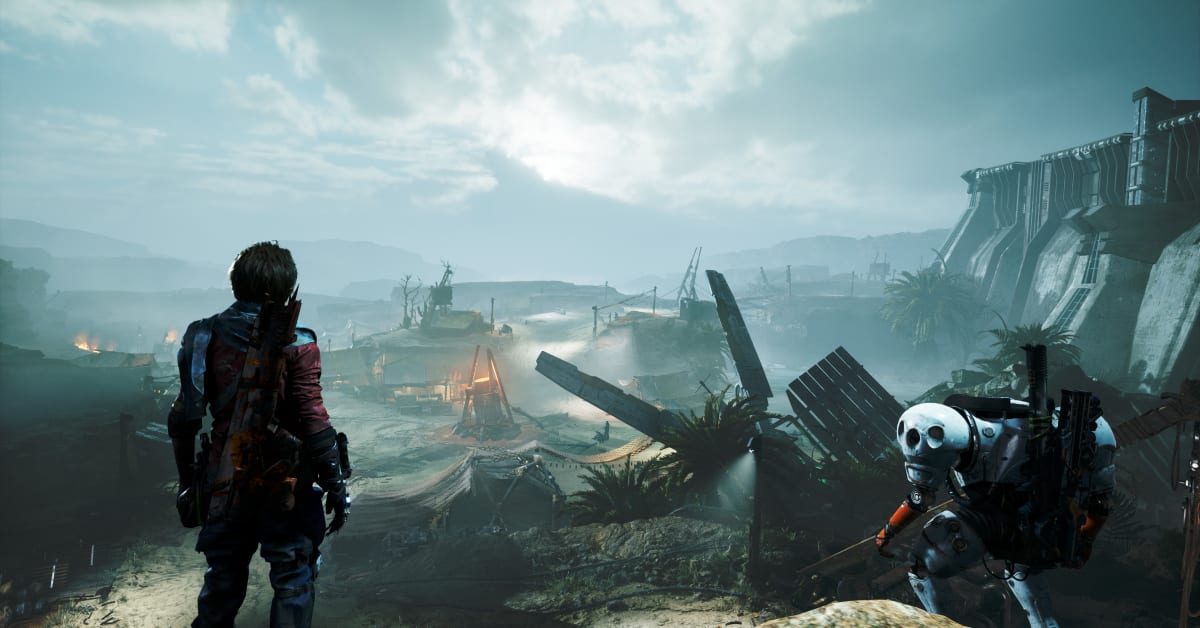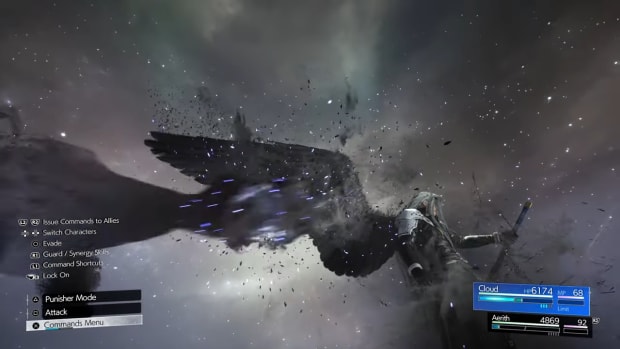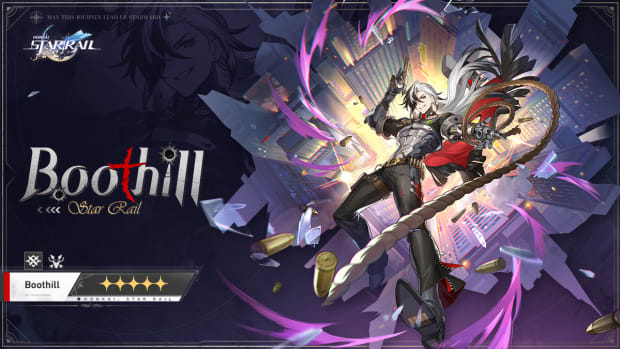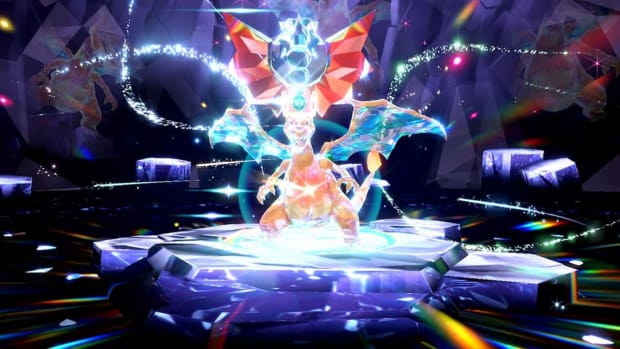
Miasma Chronicles is a warning about what happens when you rely on billionaires to fix your problems

The Bearded Ladies really seem to love post-apocalyptic settings – Mutant Year Zero: Road to Eden, Corruption 2029, and now Miasma Chronicles, the Swedish studio’s upcoming tactical RPG combining stealth game mechanics and turn-based combat. What about those scenarios tickles the team’s fancy?
“For me, it’s not just about building a world of ruin and ruins. It’s more about telling the story of how the world got there in the first place. That’s what’s interesting,” says Lee Varley, Miasma Chronicles’ game director. “In a lot of popular media we have zombies or nuclear war or a virus, which is all very cool, but I wanted to do a different future that we could possibly hit – a different kind of apocalypse. And for me it was important to look at, well, where we are now and what’s going on in the world right now. Where could that lead us, if we’re not careful?”
Miasma Chronicles’ world is desolate, with desperate survivors hanging around in isolated cities, while a mysterious substance – the Miasma – is gnawing at the fabrics of reality and starts to mutate the parts of the world it hasn’t already swallowed. As you explore the lovingly hand-crafted maps, you find pieces of lore you can read and abandoned robots you can listen to, which allow you to slowly piece together what happened to create this situation.
“We have all these really big environmental problems that we’re staring in the face,” Varley says. “And we have this mentality, I feel, of relying on big companies and eccentric billionaires to solve our problems for us, when this particular problem we really need to solve ourselves. We need to change who we are, we need to change what we do. But what if we just rely purely on very capitalistic driven companies and egocentric billionaires to solve this problem for us? What does that world look like?”
Miasma Chronicles is an exploration of that idea, though in a very fantastical way. Allow me to quote one of the robots you can find and listen to in the game, which tells you a “fun fact” sponsored by its manufacturer, one of those big megacorps. It goes something like: “Fun fact, the United States constitution is not abolished, it’s merely on hold right now.”
“And we would accept this stuff, wouldn’t we?” Varley laughs. “It’s like ‘oh well, we’re solving this big problem right now, so all your rights are now suspended, because we can’t have them while we’re solving this’ and we’re like ‘okay!’ This shit happens on a daily basis and we’ve got to start paying attention to it.”
The America of Miasma Chronicles is ruled by an organization called The First Family, an almost feudal overlord demanding tribute from towns. They have some of the most deadly technology in the game and are an oppressive force from the perspective of our main characters – but they aren’t like your mustache-twirling villains from a Saturday morning cartoon. “They are a bit more complicated than this and their goals, reasonings, and behavior have quite solid logic behind it,” Varley explains.
Working in almost slave-like conditions for The First Family or not is a question of survival – and it’s not totally unlike our own world, according to Varley. “If you want a house to live in and clothes to go with it, you’ve got to sell yourself to some company,” he explains. “The themes are not entirely different to what’s going on. If anything, in Miasma Chronicles they’re just presented in a more direct way than what it is today.”
There are a lot of serious and important themes in Miasma Chronicles, and the story itself has a few heavy moments even early on as well – one of the characters you talk to is boiled in a rusty bathtub in front of your eyes because someone thinks that they’re you. This heavily contrasts the light-hearted tone of the adventure elsewhere and some of the downright silly voice lines enemies throw at you in combat – if you listen closely, some of the mutated frog enemies you encounter will taunt you with “come play with me, daddy!” That does not sound easy to balance, does it?
“It’s incredibly difficult, because for an adventure to work for me, you need both. You need that sense of seriousness and a little bit of darkness – you need to sense that the world you’re in has dark points,” Varley says. “But you also need that sense of lightheartedness and a little bit of comedy. We have to think of it as there being a line with darkness, grittiness, death, disease, and hunger on one side, and on the other side you’ve got lightheartedness, joking, and helping people. With this game we are straight down the middle, dancing in and out of each side to give the player a little bit of both on their way.”
Hitting that tone in the right way, however, is extremely challenging. “If it contrasts too much, then it feels disjointed from each other and it feels like there are two completely different things going on that just don’t fit together,” Varley says.
The director names the Last of Us and Indiana Jones as pieces of media that get this balance right. “They don’t have Indiana Jones mass-murdering people. He’s fighting Nazis with his fists and is whipping them and doing this adventurous type of stuff,” he explains. “He’s not machine-gunning anyone down wave after wave. Because if he was doing that, we couldn’t get attached to the character.”
Varley, who previously worked for IO Interactive, was already with the Bearded Ladies for Mutant Year Zero: Road to Eden. That game’s enormous difficulty earned him a bit of a cult status among hardcore fans of the turn-based tactics genre. However, his previous stance in regards to difficulty is actually among his biggest regrets. “One of the biggest learnings for me from Mutant was that we had a lot of people who really got into the characters and the world, but the game was really, really difficult,” he says. “A lot of players got very frustrated, because they really wanted to keep going and explore it, but they couldn’t because I had this kind of elitist thinking when it came to difficulty.
“I remember thinking while analyzing everything in the months after launch: ‘It’s really not okay that we basically told people that if they want to enjoy the narrative and the story, then they must also be an expert tactician to be able to do that.’ People should really be able to just enjoy the content.”
That led to a radical new approach to difficulty in Miasma Chronicles – one that ensures the best for both types of gamers: those who enjoyed the brutal difficulty of Mutant Year Zero: Road to Eden, and those who are looking to just immerse themselves into the story. “We completely cleared our minds and started from scratch in how we handle difficulty as a concept,” Varley explains.
You can’t just choose a certain difficulty to customize your experience in the game, you can even choose between two different RNG modes – the classic “you’re missing your 97% probability shot, tough luck” and one with rounded odds that gives you a more clean-cut experience. While rushing head-long into an encounter will likely make it more difficult, you’re no longer required to snipe a handful of opponents before initiating the battle to even stand a chance at winning.
A big portion of balancing falls to the map design, and Varley says that the game’s levels went through “hundreds” of iterations to get the terrain, enemy patrols, and set-ups right: “It’s very, very time-consuming, more so than on any other tactical game, because in most of them you just go straight to tactical combat. We’ve got this other layer of positioning and looking for opportunities. That’s the bulk of the level-design time, figuring all that out.”
Despite the overall difficulty decrease, some fights are deliberately designed to trip players with a type of enemy Varley calls “the assholes” – they are there to make sure that players are kept on their toes and don’t just stick with a one-size-fits-all tactic. “We actually track this in balancing,” he says. “And when we feel the players are getting too comfortable, we’ll flip something or we’ll add a new enemy type. You’ve got to be consistently thinking.”
Varley likens playing on a higher difficulty to playing snooker: You don’t just have to plan on popping a ball off the table, you have to plan for where the white ball ends up after that.
It’s a good thing that the player’s toolkit in Miasma Chronicles is very malleable: You can reset your skills any time you want in what the developers call “golf bag approach” – just like you need a certain club at a certain hole, you can choose different skills for certain encounters. However, the traditional skill tree the team had implemented at that point proved frustrating combined with this concept, because you always had to reset the entire tree for every little adjustment and “that was just annoying as fuck,” Varley laughs. So they split the tree up into four squares with four skills each, which very much reduces the micromanagement you have to do.
Naturally, that’s another complication for the guardians of game balance – add the different weapons and abilities as well as group synergies to that, and you’ve got quite the potential for overpowered combos going. “It’s always difficult when you design a game,” Varley concludes. “We don’t want to tell the players what to do, but we need to control their progression and rein them in a bit so they don’t go overboard.”
For that, the Bearded Ladies have some very complicated Excel sheets with potential combos and numbers – something you’ll only need when playing the game’s most lethal difficulty mode once it comes out on May 23, 2023, on PC, PS5, Xbox Series X|S.






